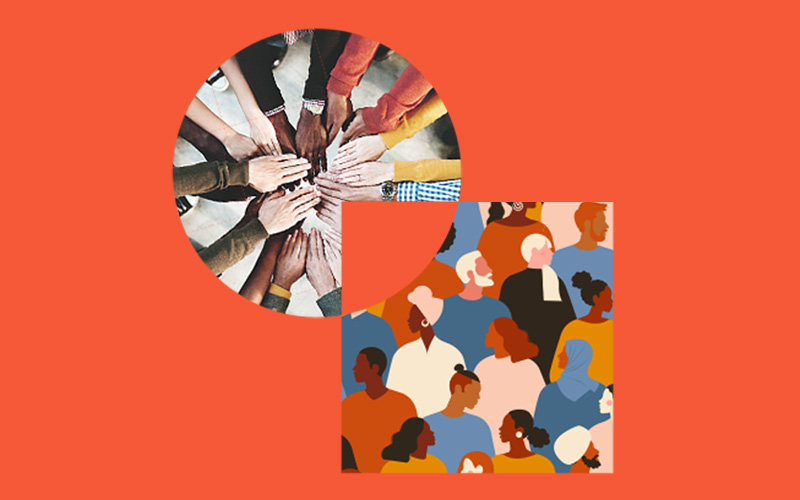Challenge your beliefs, attitudes and assumptions
Led by Professors Rachel Cowen and Dawn Edge, the unit asks you to consider concepts of privilege, dominance, and power to raise self-awareness and enhance your inclusive leadership potential.
The unit aims to equip you with Equality, Diversity and Inclusion (EDI) based knowledge, skills and attributes, which are fundamental to employability and effective working within our global and interconnected world.
You can try a one-hour taster of this unit to get a feel for the online teaching and interactive content within the modules.
Designed specifically for online learning offering a unique interactive experience.
This unit is accessible to undergraduate students from all disciplines.
About
Take personal responsibility for promoting inclusive approaches to study and work
Explore Equality, Diversity, and Inclusion (EDI) in a range of contexts, including the workplace, research and innovation, education, and health and social care.
Requested by the student body, this unit draws on university-wide and external interdisciplinary expertise, beginning with a historical overview of social reform and legal frameworks around EDI. It ends by providing you with the tools and frameworks to begin looking at your own role in driving EDI as inclusive future leaders.

Unit information
What do you need to know about this unit?
You can try a one-hour taster of this unit to get a feel for the online teaching and interactive content within the modules.
This unit has been designed specifically for online learning and offers a unique interactive experience.
- Level 2
- 10 credits
- Schools of Medical Sciences and Health Sciences
The unit aims to equip you with Equality, Diversity and Inclusion (EDI) based knowledge, skills and attributes, which are fundamental to employability and effective working within our global and interconnected world. It will empower you to take personal responsibility for promoting inclusive approaches to study and work, both here at Manchester and in your future lives and careers.
On successful completion of the unit, you will be able to:
- Define the key interlinked concepts, theories, policy and regulatory frameworks that underpin EDI
- Recognise different cultural and personal perspectives
- Analyse EDI issues in different organisations, sectors and societies
- Evaluate and discuss the causes of inequalities and drivers for diversity and inclusion
- Critically evaluate theoretical arguments and real life EDI case studies
- Identify barriers and enablers to equality, diversity and inclusion
- Analyse your own values, beliefs and codes of behaviour that may lead to bias and discrimination
Module 1: EDI: Where History, Law and Politics Meet
You will look at a historical overview of social reform and legal frameworks supporting Equality, Diversity and Inclusion. You will consider all of the protected characteristics as well as wider equality issues and discriminatory factors.
Module 2: EDI in the Workplace
You will examine workplace inequality and explore barriers and enablers of equality, and wellbeing in the workplace. You will also explore bullying, sexual harassment and stress, and strategies to counter them.
Module 3: EDI in Research and Innovation
You will explore biases and inequalities throughout the research lifecycle and innovation pipeline and look at best practices to ensure future research and innovation is accessible.
Module 4: EDI in Education
You will gain knowledge about inequalities in access to quality education, and consider how education can play a role in perpetuating inequalities and excluding marginalised groups.
Module 5: EDI in Health and Social Care
You will explore the causes and implications of inequalities in health and social care and examine good practice to reduce inequalities.
Module 6: Your role in driving EDI as inclusive future leaders
You will look at the business case for Equality, Diversity and Inclusion and explore inclusive leadership traits, behaviours, and frameworks to promote inclusive organisational cultures.
This unit is delivered online via Canvas.
There will be student support through discussion forums and virtual 'drop-in' sessions.
Modules adopt a highly interactive approach, including quizzes, videos and case studies and draw on current policy, best practice examples and the research evidence base, allowing you to evaluate diverse perspectives and hear from leading researchers and practitioners in the field.
- Online end-of-module assessments (20%)
- 750-word blog post (30%)
- 1500 word essay (50%)
Unit leads: Rachel Cowen and Dawn Edge
Module leads/key equality experts from within and outside the University: Janette Martin, Elaine Dewhirst, Liam Shields, Susie Miles, Catherine Atkinson, Suzanne Johnson, Alina Kadyrova, Philip Shapira, Isabel Tavora, Sheena Johnson, Alys Young, Jacqueline Kilbane, Crispen Sachikonye, Cath Prescott and Paul-Marks-Jones.
UCIL units are designed to be accessible to undergraduate students from all disciplines.
UCIL units are credit-bearing and it is not possible to audit UCIL units or take them for additional/extra credits. You must enrol following the standard procedure for your School when adding units outside of your home School.
If you are not sure if you are able to enrol on UCIL units you should contact your School Undergraduate office. You may wish to contact your programme director if your programme does not currently allow you to take a UCIL unit.
How to enrol
UCIL units are designed to be accessible to undergraduate students from all disciplines. Depending on your School enrolment can be completed in one of two ways:
Enrolment using the Course Selection System
You may be able to enrol directly onto a UCIL unit using the Course Unit Enrolment System.
Enrolment via your School
If you cannot see the UCIL unit you wish to study or it is blocked out on the Course Unit Enrolment System you may need to request approval to study the unit directly from your School.
Please get in touch with the UCIL team at ucil@manchester.ac.uk if you have any questions.

